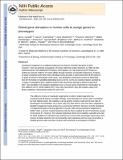Global gene disruption in human cells to assign genes to phenotypes
Author(s)
Ploegh, Hidde; Yuan, Bingbing B.; Carette, Jan E.; Guimaraes, Carla P.; Wuethrich, Irene; Blomen, Vincent A.; Varadarajan, Malini; Sun, Chong; Bell, George W.; Muellner, Markus K.; Nijman, Sebastian M.; Brummelkamp, Thijn R.; ... Show more Show less
DownloadPloegh_Global gene.pdf (1.512Mb)
OPEN_ACCESS_POLICY
Open Access Policy
Creative Commons Attribution-Noncommercial-Share Alike
Terms of use
Metadata
Show full item recordAbstract
Insertional mutagenesis in a haploid background can disrupt gene function[superscript 1]. We extend our earlier work by using a retroviral gene-trap vector to generate insertions in >98% of the genes expressed in a human cancer cell line that is haploid for all but one of its chromosomes. We apply phenotypic interrogation via tag sequencing (PhITSeq) to examine millions of mutant alleles through selection and parallel sequencing. Analysis of pools of cells, rather than individual clones[superscript 1] enables rapid assessment of the spectrum of genes involved in the phenotypes under study. This facilitates comparative screens as illustrated here for the family of cytolethal distending toxins (CDTs). CDTs are virulence factors secreted by a variety of pathogenic Gram-negative bacteria responsible for tissue damage at distinct anatomical sites[superscript 2]. We identify 743 mutations distributed over 12 human genes important for intoxication by four different CDTs. Although related CDTs may share host factors, they also exploit unique host factors to yield a profile characteristic for each CDT.
Date issued
2011-05Department
Massachusetts Institute of Technology. Department of Biology; Whitehead Institute for Biomedical ResearchJournal
Nature Biotechnology
Publisher
Nature Publishing Group
Citation
Carette, Jan E et al. “Global Gene Disruption in Human Cells to Assign Genes to Phenotypes by Deep Sequencing.” Nature Biotechnology 29.6 (2011): 542–546.
Version: Author's final manuscript
ISSN
1087-0156
1546-1696